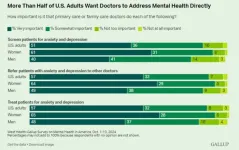(Press-News.org)
People with poorer mental health are more prone to browsing negative content online, which further exacerbates their symptoms, finds a study led by UCL researchers.
The relationship between mental health and web-browsing is causal and bi-directional, according to the Wellcome-funded study published in Nature Human Behaviour.
The researchers have developed a plug-in tool* that adds ‘content labels’ to webpages—similar to nutrition labels on food—designed to help users make healthier and more informed decisions about the content they consume. These labels emphasise the emotional impact of webpage content, along with its practicality and informativeness.
Co-lead author Professor Tali Sharot (UCL Psychology & Language Sciences, Max Planck UCL Centre for Computational Psychiatry and Ageing Research, and Massachusetts Institute of Technology) said: “Our results show that browsing negatively valenced content not only mirrors a person’s mood but can also actively worsen it. This creates a feedback loop that can perpetuate mental health challenges over time.”
Over 1,000 study participants answered questions about their mental health and shared their web browsing history with the researchers. Using natural language processing methods, the researchers analysed the emotional tone of the webpages participants visited. They found that participants with worse moods and mental health symptoms were inclined to browse more negative content online, and after browsing, those who browsed more negative content felt worse.
In an additional study, the researchers manipulated the websites people visited, exposing some participants to negative content and others to neutral content. They found that those exposed to negative websites reported worse moods afterward, demonstrating a causal effect of browsing negative content on mood. When these participants were then asked to browse the internet freely, those who had previously viewed negative websites—and consequently experienced a worse mood—chose to view more negative content. This finding highlights that the relationship is bi-directional: negative content affects mood, and a worsened mood drives the consumption of more negative content.
Co-lead author, PhD student Christopher Kelly (UCL Psychology & Language Sciences, Max Planck UCL Centre for Computational Psychiatry and Ageing Research, and Massachusetts Institute of Technology), said: "The results contribute to the ongoing debate regarding the relationship between mental health and online behaviour.
“Most research addressing this relationship has focused on the quantity of use, such as screen time or frequency of social media use, which has led to mixed conclusions. Here, instead, we focus on the type of content browsed and find that its emotional tone is causally and bidirectionally related to mental health and mood."
To check whether an intervention could be used to change web-browsing choices and improve mood, the researchers conducted a further study. They added content labels to the results of a Google search, which informed participants whether each search result would likely improve their mood, make it worse, or have no impact. Participants were then more likely to choose the positively-labelled sites deemed likely to improve their mood—and when asked about their mood after, those who had looked at the positive websites were indeed in better moods than other participants.
In response, the researchers have developed a free browser plug-in that adds labels to Google search results, providing three different ratings of how practical a website’s content is, how informative it is, and how it impacts mood.
Professor Sharot said: “We are accustomed to seeing content labels on our groceries, providing nutritional information such as sugar, calories, protein, and vitamins to help us make informed decisions about what we eat. A similar approach could be applied to the content we consume online, empowering people to make healthier choices online.”
* Digital Diet browser extension
END
Toronto, ON – A recent longitudinal study from the University of Toronto reveals the mental health consequences of the COVID-19 pandemic on older adults living with migraine.
Using a sample of more than 2,000 older adults with migraine from the Canadian Longitudinal Study on Aging, researchers examined changes in depression status among this population during the pandemic. More than 1 in 7 older adults with migraine experienced depression for the first time during the COVID-19 pandemic, while approximately 1 in 2 with a previous history of depression experienced a recurrence during this period.
“People ...
A new study published in Nature Climate Change estimates that a 1-meter sea level rise by 2100 would affect over 14 million people and $1 trillion worth of property along the Southeast Atlantic coast, from Norfolk, Virginia, to Miami, Florida.
The study assesses the cumulative impact of multiple climate-driven coastal hazards, including sea level rise, flooding, beach erosion, sinking land, and rising groundwater, all of which are expected to worsen significantly by the end of the 21st century.
The scale of these interconnected ...
Females sleep less, wake up more often and get less restorative sleep than males, according to a new animal study by CU Boulder researchers.
The findings, published in the journal Scientific Reports, shed new light on what may underlie sleep differences in men and women and could have broad implications for biomedical research, which for decades has focused primarily on males.
“In humans, men and women exhibit distinct sleep patterns, often attributed to lifestyle factors and caregiving roles,” said senior author Rachel Rowe, assistant professor of integrative physiology. “Our results suggest that biological ...
WASHINGTON, D.C. — Nov. 21, 2024 — A majority of Americans (70%) say they would prefer to be asked about both their physical and mental health during medical appointments with their primary care providers (PCPs). The finding from the new West Health-Gallup Survey on Mental Health in America comes as more than one in five U.S. adults, or 59.3 million people, were living with a mental illness in 2022, and little more than half of them (50.6%) received treatment within the prior year.
According to the survey, majorities of men (65%) and women (76%) are eager to discuss both their mental and physical health with their primary ...
by Amy Norton
PISCATAWAY, NJ – The risks of alcohol and other drug consumption to the user are well known, but many Americans--nearly 160 million--say they’ve been harmed by someone else’s substance use, according to a new study in the Journal of Studies on Alcohol and Drugs.
In a national survey of U.S. adults, researchers found that 34% said they’d ever suffered “secondhand harm” from someone else’s alcohol use--ranging from marriage and family problems to financial fall-out to being assaulted or injured in a drunk-driving accident. Meanwhile, 14% said they’d been harmed ...
Plasma-derived atomic hydrogen (PDAH) enables low-temperature carbon dioxide methanation reaction through the Eley−Rideal-type reaction channel, improving methane yield at low temperatures, as shown by scientists at Science Tokyo. The findings underscore the potential of PDAH in advancing sustainable carbon dioxide recycling methods and optimizing other catalytic hydrogenation reactions, providing a promising avenue for improved efficiency in various energy and environmental technologies.
Despite declining reserves and significant carbon dioxide (CO2) emissions contributing to ...
The just-announced Nobel Prize in Chemistry was awarded to University of Washington Professor David Baker, Google DeepMind CEO Hershavis, and Principal Investigator John Jumper for their work using AI to predict the structure of proteins, enabling the discovery of new drugs and new materials. In an era where AI and data are driving the scientific revolution, quantum computing technology is emerging as another game-changer in the development of new drugs and new materials.
Dr. Hyang-Tag Lim's ...
Can a single protein-encoding gene determine whether a vertebrate embryo develops normally? Yes, according to Osaka Metropolitan University researchers, who found that suppression of Pcdh8 is essential for the notochord to elongate properly in zebrafish.
Graduate School of Medicine Dr. Masatake Kai and Professor Makoto Kondo focused on this paraxial protocadherin (PAPC), which is excluded when dividing cells migrate and form the notochord in the embryo.
In the experiments with zebrafish embryo, when this PAPC is not ...
NOVEMBER TIP SHEET - SYLVESTER COMPREHENSIVE CANCER CENTER
CANCER RESEARCH
Sylvester Researchers to Share Insights at ASH 2024 Annual Meeting
Dozens of physician-scientists and other investigators from Sylvester Cancer will share their insights at ASH 2024, the American Society of Hematology’s 66th-annual meeting in San Diego, Dec. 7-10. Sylvester researchers will be involved in more than 130 presentations, including oral, poster and special sessions. Additionally, Sylvester Director Stephen D. Nimer, MD, will receive the 2024 ASH Mentor Award for his exemplary work in mentoring trainees and colleagues.
BREAST CANCER
The Cancer Journey: Asking For and Accepting Help
Journalist ...
Algorithms that can detect subtle changes in a person’s voice are emerging as a potential new diagnostic tool for Parkinson’s disease, according to researchers from Iraq and Australia.
Speech impairments are often the first indicators of the fastest-growing neurological disease in the world, affecting more than 8.5 million people, but traditional diagnostic methods are often complex and slow, delaying early detection.
Researchers from Middle Technical University (MTU) in Baghdad and the University of South Australia (UniSA) have recently published a conference paper reviewing ...





